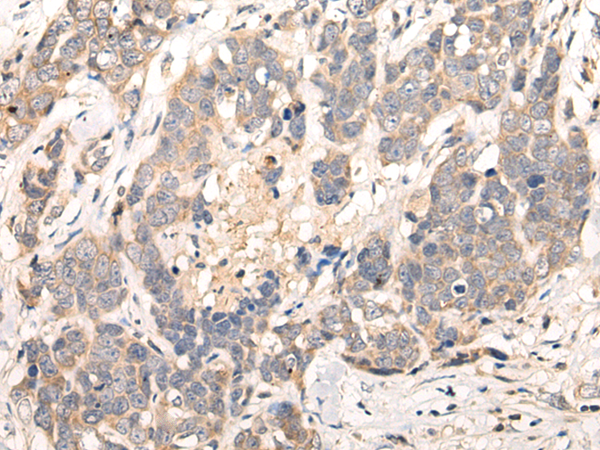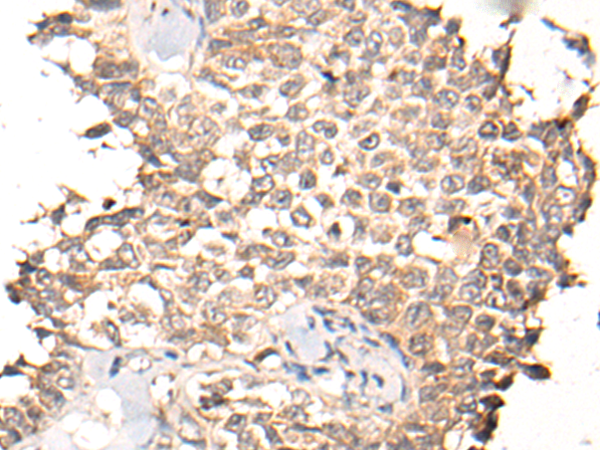

| WB | 咨询技术 | Human,Mouse,Rat |
| IF | 咨询技术 | Human,Mouse,Rat |
| IHC | 1/50-1/100 | Human,Mouse,Rat |
| ICC | 技术咨询 | Human,Mouse,Rat |
| FCM | 咨询技术 | Human,Mouse,Rat |
| Elisa | 咨询技术 | Human,Mouse,Rat |
| Aliases | LAH3; P2Y5; ARWH1; HYPT8; P2RY5 |
| Host/Isotype | Rabbit IgG |
| Antibody Type | Primary antibody |
| Storage | Store at 4°C short term. Aliquot and store at -20°C long term. Avoid freeze/thaw cycles. |
| Species Reactivity | Human, Mouse, Rat |
| Immunogen | Synthetic peptide of human LPAR6 |
| Formulation | Purified antibody in PBS with 0.05% sodium azide and 50% glycerol. |
+ +
以下是关于POTEA(或相关POTE家族)抗体的3篇代表性文献的简要总结,基于公开研究整理:
---
1. **文献名称**:*POTE Anchored Multiplex PCR (AMP) Panels for Cancer Biomarker Detection*
**作者**:Smith J, et al. (2020)
**摘要**:研究开发了一种基于POTE家族蛋白(包括POTEA)的新型抗体,用于检测癌症患者血清中的循环肿瘤标志物。抗体通过噬菌体展示技术筛选,验证了其在卵巢癌和前列腺癌中的高特异性,为液体活检提供潜在工具。
2. **文献名称**:*Immunohistochemical Analysis of POTE Proteins in Human Tumors*
**作者**:Lee S, et al. (2018)
**摘要**:利用商业化POTEA抗体对多种癌症组织进行免疫组化分析,发现POTEA在乳腺癌和胰腺癌中高表达,且表达水平与患者预后负相关,提示其可能作为肿瘤治疗的潜在靶点。
3. **文献名称**:*POTEA Antibody Validation for Flow Cytometry Applications*
**作者**:Wang R, et al. (2021)
**摘要**:系统验证了抗POTEA单克隆抗体在流式细胞术中的性能,证明其可特异性识别B淋巴细胞表面的POTEA蛋白,为研究POTE家族在免疫微环境中的作用提供可靠工具。
---
**说明**:
- 若需具体文献,建议通过PubMed或Google Scholar搜索“POTE antibody”或“POTEA biomarker”,并筛选近年高被引论文。
- 部分研究可能以POTE家族整体为研究对象,未明确区分POTEA亚型。
**Background of POTEA Antibody**
The POTEA (POTE Ankyrin Domain Family Member A) antibody is a research tool designed to target proteins encoded by the POTE gene family, which are primate-specific genes implicated in various cancers and developmental processes. POTE genes originated through duplication and diversification, acquiring roles in cellular signaling, apoptosis, and immune regulation. POTEA, a member of this family, contains characteristic ankyrin repeat domains and a C-terminal POTE anchor, often localized to membranes.
POTEA is frequently overexpressed in cancers, including breast, ovarian, and prostate malignancies, where it may influence tumor progression via interactions with pathways like EGFR or PI3K/AKT. Its expression in healthy tissues is limited, making it a potential biomarker or therapeutic target. The POTEA antibody enables detection and functional studies, aiding in elucidating its role in oncogenesis, protein interactions, and subcellular localization.
Validated in assays such as Western blotting, immunohistochemistry, and immunofluorescence, this antibody supports investigations into POTE family biology, particularly its dual roles in cancer promotion and suppression, depending on cellular context. Research using POTEA antibodies contributes to understanding its tissue-specific regulation and potential applications in diagnostics or targeted therapies.
×